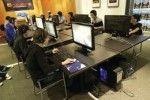A group of students found a way of using their shared hobby of playing video games to help pay the bills while working toward earning a college degree.
The five-member team, College Station League of Legends, earned the title of No. 1 college League of Legends team in the world and won $40,000 at a tournament hosted by the Collegiate StarLeague in Los Angeles, Calif., on Feb. 17.
The team went undefeated in the tournament and plans to split the $40,000.
For me and probably most of the other guys [the prize money] is pretty much just going right back into school, said Justin Pulliam, senior computer science major. You know, for paying off loans or future classes however they decide to use it.
The team plans to utilize the $40,000 as a practical approach to financial stability, as opposed to a means to pursue the sport professionally.
[Competitive gamers] can go from being [financially stable] to being in a situation where [they] dont have much to fall back on, Pulliam said. Id have a degree, so Id probably still be OK but I just think its probably smarter to pursue a career than to pursue a game that will die out in at least a few years.
According to League of Legends gamers, professional gamers are distinct from competitive gamers in that they are sponsored by large companies and earn a salary in addition to tournament winnings.
Professionals basically eat, sleep and live together, and playing the game is their job, Schaeffer said. The top-level teams have a house where all of their members live together they wake up and play the game.
Pulliam said the fading popularity of once-major games and sponsors as funding sources are the main reasons that job stability in professional gaming is unreliable.
Ive seen tons of games become competitive and then almost overnight, the game completely disappears and is no longer being funded because the [source of funding] is a sponsorship from a company such as [energy drink companies] or some computer hardware company, Pulliam said. So if [the sponsors] stop giving funding, that team doesnt exist anymore.
Made up of students, the team said the idea of balancing school or a career and playing video games on such an extreme scale is improbable.
I think for most of us, we want to put school first, said freshman electrical engineering major Dean Keyser. [Gaming] is just a hobby in the end.
According to sophomore chemical engineering major Andrew Shaeffer, the team rarely had time to practice together prior to the tournament due to time constraints and schedule conflicts, but ultimately they were successful due to the individual skill levels of its members.
Through the [qualifiers and tournaments], we were individually very skilled, so we just overpowered our opponents through individual skill, Schaeffer said. As for teamwork, we did practice together on occasion, but it wasnt anything too heavy. It was pretty light and casual practicing.
According to Pulliam, since the formation of the team in October, their hobby most resembled a job on the day before finals at the tournament when the team underwent its first comprehensive strategy and practice session.
The day before finals, we played from 12 p.m. to 12 a.m., Schaeffer said. It was kind of like cramming for finals.
In order to clear space in their academic schedules to travel to the tournament, team members had to work ahead on classwork.
I think I missed maybe three days of school, Pulliam said. I missed an exam during that time, and I had to finish projects way ahead of time because I was going to be gone.
Schaefer said the game helps him through school in a different way.
At school there is all this chemical engineering, chemistry and all this stuff, Schaefer said. So I guess it puts me in a more relaxed mood.
After winning the CSL tournament, the team had unknowingly qualified for another tournament in which they will be able to compete against professional gamers.
This tournament is where mostly professional teams who actually do this for a living go and compete, so its just an opportunity for us to play with the big dogs, Pulliam said.
Team manager Elizabeth Olvera said future tournaments would reward players with scholarships instead of with money.
Regardless of where their gaming and academic careers lead, Keyser said the tournament win itself was an accomplishment for the team members.
I think at the very end, when we won the thing, the feeling of just winning something after working through it is a really good feeling of accomplishment, Keyser said. We did something, we worked for it and we got what we wanted out of it.
Student gamers use tournament winnings to help pay tuition
March 16, 2013

0
Donate to The Battalion
Your donation will support the student journalists of Texas A&M University - College Station. Your contribution will allow us to purchase equipment and cover our annual website hosting costs.
More to Discover








